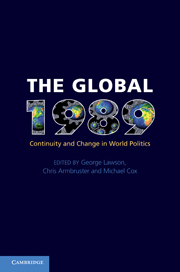Book contents
- Frontmatter
- Contents
- List of figures
- List of tables
- Notes on contributors
- Acknowledgements
- List of abbreviations
- Introduction: the ‘what’, ‘when’ and ‘where’ of the global 1989
- Part I What and when
- 1 Back to the future of nineteenth-century Western international thought?
- 2 The return of primitive accumulation
- 3 What is left after 1989?
- Part II Where
- Part III Continuity and change
- Conclusion: was there a global 1989?
- Bibliography
- Index
3 - What is left after 1989?
Published online by Cambridge University Press: 05 June 2012
- Frontmatter
- Contents
- List of figures
- List of tables
- Notes on contributors
- Acknowledgements
- List of abbreviations
- Introduction: the ‘what’, ‘when’ and ‘where’ of the global 1989
- Part I What and when
- 1 Back to the future of nineteenth-century Western international thought?
- 2 The return of primitive accumulation
- 3 What is left after 1989?
- Part II Where
- Part III Continuity and change
- Conclusion: was there a global 1989?
- Bibliography
- Index
Summary
1989 and the left
This chapter is concerned both with the left in a narrow political sense and with broader aspects of the socio-political context which has developed in Europe and elsewhere in the past two decades. I shall focus particularly on Europe, since it is the region I know best, and in situating a reflection on post-communist Europe in the context of Europe as a whole, my aim is to complement other contributions in this book, not least Barbara Falk's emphasis on the United States (Chapter 11), Fred Halliday's chapter on the post-socialist Third World (Chapter 5) and, most directly, Laure Delcour's chapter on the shift to a ‘global Europe’ (Chapter 6). I have not addressed the situation in Russia, since this is well covered in Aviezer Tucker's chapter (Chapter 7).
Major turning points in European and, to some extent, world history of the recent past can be located in 1945, or 1968, or, more pessimistically, the mid-1970s as the prosperity of the West came under pronounced economic and environmental pressures. It was, however, the developments of ‘1989 and all that’ which attracted the newly reinvented label of the ‘End of History’ (Fukuyama 1989) and encouraged some of the ‘post’-conceptualisations which had emerged earlier. The revolutions of 1989 also provided a particular challenge to social-scientific explanation. The tip of this iceberg was the element of surprise they provided for almost all observers (Outhwaite and Ray 2005: ch. 1).
- Type
- Chapter
- Information
- The Global 1989Continuity and Change in World Politics, pp. 76 - 94Publisher: Cambridge University PressPrint publication year: 2010

